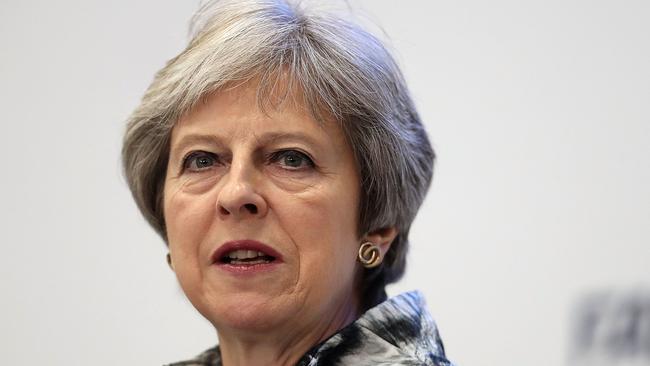Brexit: Theresa May survives another party revolt
Theresa May has narrowly avoided an embarrassing defeat in a parliament vote after threatening rebels with a general election.

Theresa May threatened Conservative rebels with a general election this summer if they defeated her plans on customs after Brexit.
Tory whips issued the warning to Remain-backing MPs, led by the former ministers Stephen Hammond and Nicky Morgan, minutes before a crucial vote last night that would have kept Britain inside a customs union.
The prime minister survived the vote by a majority of six, although 12 of her MPs walked through the opposition division lobbies in defiance.
One rebel revealed the threats by Chris Pincher, the deputy chief whip. “[Pincher] said they would pull the third reading of the [trade] bill and call a vote of confidence. He said we’d be responsible for a general election and putting Jeremy Corbyn in No 10. It was appalling behaviour. Totally disgraceful.”
Under the Fixed-term Parliaments Act two votes of no confidence two weeks apart, both carried by a simple majority in the Commons, would trigger a general election.
Another Tory Remain supporter described the whips’ behaviour as “horrible”. The whips also feared that a defeat would lead to more letters being sent by the party’s MPs to Graham Brady, chairman of the 1922 Committee, forcing a leadership vote before parliament goes into recess next Tuesday.
Jo Swinson, the Liberal Democrat MP who is on maternity leave, accused the government of betraying a promise that she would be “paired” with a Tory MP — where neither member votes — to ensure that her absence did not count against her. On Twitter she claimed that her pair, Brandon Lewis, had broken the agreement and voted, adding: “Desperate stuff.”
Government sources said last night (Tuesday) that Mr Lewis had “cocked up”. Ms Swinson’s complaints were not echoed by Labour, which also has a number of female MPs on maternity leave.
The Commons rejected the customs union amendment by 307-301 after four Labour Brexiteers — plus one sitting as an independent — backed the government. The latest amendment was tabled by Mr Hammond. It stated that if a free trade area had not been negotiated by January 21 ministers must change tack and start discussions on joining a customs union. Labour backs the idea of a customs union with the European Union after Brexit, but the government says this would leave Britain unable to strike its own international trade deals.
Mrs May was defeated on a separate amendment to the trade bill, which will require her to seek continued UK participation in the EU’s system for regulating medicines after Brexit. The government will seek to overturn the amendment in the Lords.
A YouGov poll for The Times shows that Labour’s poll lead over the Conservatives has grown to five points, rising steadily since the Chequers Brexit compromise was agreed almost two weeks ago. It puts Labour on 41 per cent, the Tories on 36 per cent, the Liberal Democrats on 9 per cent and the UK Independence Party (Ukip) on 7 per cent. Until last month the Conservatives were consistently enjoying leads of four to five points. The poll also recorded the highest level of support for a second EU referendum to date, at 40 per cent.
Today (Wednesday) Mrs May faces a resignation speech from Boris Johnson, the former foreign secretary, in which he is expected to denounce her Brexit plan. One source in the party said that he had his “tail up” after recent polling suggested a rise in support among grassroots members since his resignation.
She must then face a meeting of the 1922 Committee of Tory backbenchers. Last night David Davis, who resigned as Brexit secretary last week, warned that Mrs May had almost no room for manoeuvre. Asked what would happen if she made any further compromises, he told Channel 4 News: “At that point the majority starts to slip away.”
Sir Nicholas Soames became the first Conservative MP to call publicly for a cross-party government of national unity yesterday. He told Channel 4: “I must say if I had my way we would have a national government to deal with this. I think it is a national problem. It is the most serious problem this country has faced since the war.”
Sir John Major, the former prime minister, likened Tory Brexiteers to the Tea Party group of Republicans in the US. He said that they posed a greater threat than the Maastricht rebels he faced in the 1990s that brought the government to its knees. “There are more of them now than there were in the 1990s”, told ITV News. “There is a bit of a Tea Party grouping within the hardline European Research Group and that makes it very difficult to negotiate with them.” He said that there was a case for a second referendum.
Separately the government dropped plans to bring forward the MPs’ summer holidays to quell the crisis in the Tory party. MPs are due to rise for the summer recess on July 24, but a motion tabled on Monday night would have meant the Commons rising on Thursday. The government did not move the motion, amid growing opposition within the party to the plan.
The Times





To join the conversation, please log in. Don't have an account? Register
Join the conversation, you are commenting as Logout